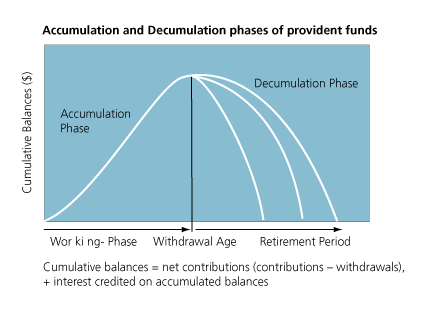Asia
- success or failure?
Provident funds governance
By:
Mukul
G Asher
Insights 42, June 2002
Many Asian countries rely on
provident funds to finance retirement. Globalisation, rapid ageing, a need
for fiscal consolidation and more individualistic preferences have
increased the significance of provident funds, but substantive reforms in
their governance are needed to realise their full potential.
Provident funds collect mandatory
contributions, with the investment risk being borne by the plan member
rather than by the plan sponsor. Provident fund accounts move through two
main phases (Figure 1).

In an initial accumulation phase,
provident fund account balances expand as pension contributions grow with
compound interest. This requires that pre-retirement withdrawals be
minimised and that positive real rates of interest are earned. In a second
phase, the funds accumulated over the working years are used during
retirement. During this phase, longevity risk (the risk that a person may
outlive his or her resources) and inflation risk (the risk that the real
value of fund balances decline) must be addressed.
Norm of centralisation
In both phases, investment policies and performance are of crucial
importance. As provident fund contributions are in the nature of
contractual long-term savings, their investment in profitable projects can
increase fund balances and enhance long-term rates of economic growth.
With the exception of Hong Kong, centralised investment management by the
provident fund authorities has been the norm in Asia.
The pension literature draws attention to the
importance of governance issues in fund investment. These concern
responsibility for trusts, i.e.
balancing risk and returns in investing the funds
tractability, i.e. ensuring that all
dealings of the provident fund are undertaken in a transparent manner
accountability, i.e. establishing
procedures to hold provident fund management responsible for the fund
outcomes.
Managing investments
In all Asian countries, investment policies and performance are in need of
substantial improvement. In high income but rapidly ageing Singapore, a
government investment company whose operations are by law non-transparent
and non-accountable is ultimately responsible for the investment of
provident fund balances. This has led to a highly regressive large tax on
provident fund wealth and to low replacement rates. In others, such as
Thailand, Malaysia, and Sri Lanka, international diversification of
provident fund assets is lacking. As their domestic financial and capital
markets have limited depth, there is an overemphasis on government
securities and other government guaranteed assets in their portfolio. Lack
of independence from the political authorities has complicated the
investment function in Asia.
In most developing countries,
performing the core administrative tasks of provident funds satisfactorily
remains a major challenge. There is also a need to review periodically the
relevant laws, regulations, organisational structures and procedures, and
design details of various schemes of the provident funds. Some Asian
countries, such as Malaysia and Singapore, have been fairly successful in
undertaking core administrative tasks effectively while others, such as
India, Indonesia, and Sri Lanka, need to make substantial progress in this
area.
Strategies for change
Consideration should be given to setting up national regulatory agencies
for the pensions sector. Such agencies, staffed by independent-minded and
competent professionals, could help ensure greater professionalism and
educate stakeholders on the importance of governance issues. Strategies
for changing the organisational culture of provident funds are also
required. Encouraging research on pension issues within each country may
assist in developing more informed and locally relevant pension programmes
and strategies. Complementary reforms in the financial and capital markets
and in corporate and state-owned enterprise governance are also essential.
In the final analysis, there is no substitute for creating a policy
environment in which provident funds can pursue good governance.
FAIR USE NOTICE: This
page contains copyrighted material the use of which has not been
specifically authorized by the copyright owner. Global Action on Aging
distributes this material without profit to those who have expressed a
prior interest in receiving the included information for research and
educational purposes. We believe this constitutes a fair use of any such
copyrighted material as provided for in 17 U.S.C § 107. If you wish to
use copyrighted material from this site for purposes of your own that go
beyond fair use, you must obtain permission from the copyright owner.
|

